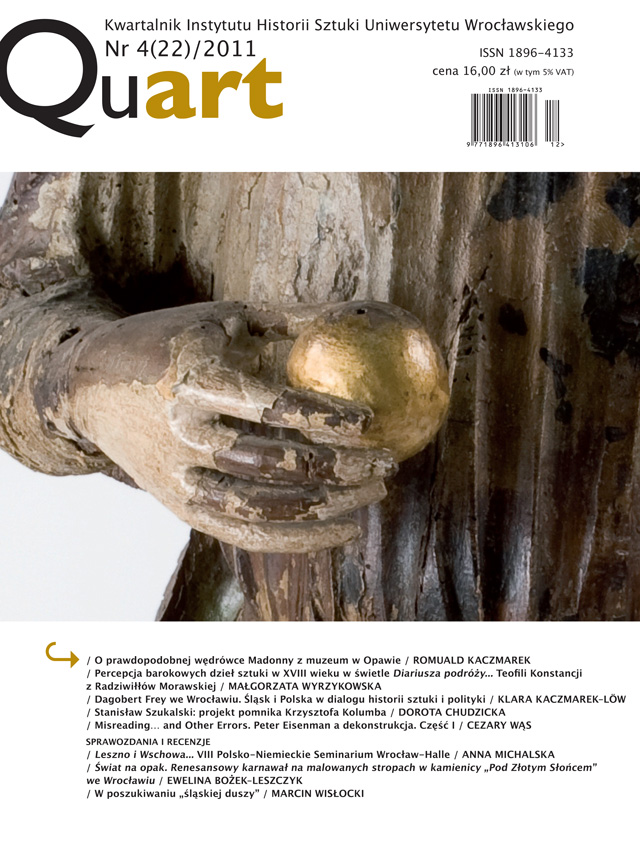W poszukiwaniu „śląskiej duszy”
In Search of the "Silesian Soul"
Author(s): Marcin WisłockiSubject(s): History, Fine Arts / Performing Arts, Cultural history, History of Art
Published by: Wydawnictwo Uniwersytetu Wrocławskiego
Summary/Abstract: Jan Harasimowicz, Schwärmergeist und Freiheitsdenken. Beiträge zur Kunst- und Kulturgeschichte Schlesiens in der Frühen Neuzeit, [Spirit of dreaminess and thought of freedom. Studies on art and culture history of Silesia in Early Modern Times] Schwärmergeist und Freiheitsdenken – a book by Jan Harasimowicz published under the same title is a collection of 19 studies devoted to Early Modern art and culture of Silesia. The chapters ordered around five basic questions – “exceptionality” of confessional situation in Silesia, cult of saints and heroes, problems of ars moriendi and pompa funebris, selected aspects of architecture and art, and Silesian-Polish relations – present a wide spectrum of phenomena and tendencies characteristic for the times of their origins and shaping the confessions in the discussed region. The main objective of this volume is presentation of diversity and richness of Silesian culture heritage in Early Modern period, when confessions and forms of piety serving their expression in national languages not only co-existed but also intermingled and reacted. The texts that build this vast and complex vision exemplify subsequent development of iconographical and iconological methods, which is related to more than before stressed and fulfilled demand of using written sources of the period as a sine qua non condition of comprehending the essence of phenomena and changes taking place in Europe in the time of confessionalisation.The distinct specific of the discussed region has appeared in the view of the author’s studies and it cannot raise any doubts – it has its origins in particular confessional situation, meaning Lutheran Reformation victory in the lands under Catholic territorial rule, among others. The elements indicating these specifics are: not surrendering to Prague or Vienna’s reason of State with simultaneous drawing inspirations from them, strive for freedom of thought and freedom of practice religion, liability to irenicisism or, last but not least, to mystic spiritualism. Moreover, the “spirit of dreaminess” and “thought of freedom” mentioned in the title, as constitutive traits of Silesian culture during the reign of the Habsburgs, could be widely found regardless of confessional borders. This exactly was, according to the author, the expression of “a Silesian soul”.
Journal: Quart
- Issue Year: 22/2011
- Issue No: 4
- Page Range: 102-107
- Page Count: 6
- Language: Polish

